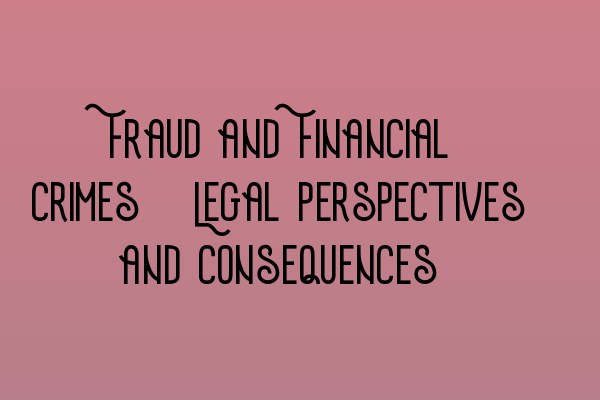Fraud and Financial Crimes: Legal Perspectives and Consequences
Introduction
Welcome to SQE Criminal Law & Practice Law UK, your trusted resource for all things related to criminal law and practice. In this blog post, we will delve into the world of fraud and financial crimes, exploring the legal perspectives and consequences associated with these offenses.
Understanding Fraud
Fraud is a serious offense that involves deception or dishonesty for personal gain. Common types of fraud include identity theft, credit card fraud, healthcare fraud, and securities fraud. Perpetrators of fraud may use various strategies to deceive individuals, businesses, or even governmental entities.
The Legal Framework
In the UK, fraud is primarily governed by the Fraud Act 2006. This legislation outlines the various offenses related to fraud and the penalties associated with them. It is essential for legal professionals to have a deep understanding of this Act in order to effectively represent clients accused of fraud.
Fraud and Financial Crimes Investigations
Investigating fraud and financial crimes requires a combination of legal expertise and technical skills. Law enforcement agencies, such as the Serious Fraud Office (SFO), collaborate with financial institutions, forensic accountants, and digital forensics experts to gather evidence and build strong cases against the perpetrators.
Consequences and Penalties
The consequences of engaging in fraudulent activities can be severe. Depending on the nature and severity of the offense, individuals convicted of fraud may face imprisonment, hefty fines, restitution, or other forms of punishment imposed by the court. It is crucial for those accused of fraud to seek legal representation to navigate the complex legal process and mitigate the potential consequences.
Defenses Against Fraud Charges
There are several defenses that can be used in cases involving fraud allegations. These defenses may include lack of intent, mistake, duress, or reasonable belief in a false statement. It is essential for legal professionals to carefully analyze the evidence and craft a strong defense strategy to protect the rights and interests of their clients.
Conclusion
Fraud and financial crimes pose a significant threat to individuals, businesses, and society as a whole. Understanding the legal perspectives and consequences associated with these offenses is crucial for legal professionals practicing in the field of criminal law. If you are interested in expanding your expertise in criminal practice, we invite you to explore our related articles:
- Workshops and Seminars on Criminal Practice: Expanding Your Expertise
- Updates in UK Criminal Laws: Staying Informed and Prepared
- Enhancing Your SQE Criminal Law Study Group Experience
- Decoding Criminal Evidence Rules: A Detailed Analysis
- Ensuring Rights of Victims in Criminal Procedures: Legal Protections and Support
